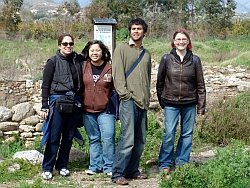The school video will provide a better impression of the school, its classrooms, the school activities and the city of Tropea!
martedì 6 maggio 2008
Study abroad program in Italy


Now the Piccola Università Italiana has expanded the existing programs and has inaugurated a STUDY ABROAD PROGRAM with MINNESOTA STATE UNIVERSITY, MANKATO. This blog was created to offer space to our students from the United States attending this very special Study Abroad Program in Italy. Their impressions, thoughts, experiences, and adventures during their time in Southern Italy, Tropea will be posted on this blog and it will give space to those, who are interested in the Italian culture and Italian language and who always wanted to learn more about this beautiful country.

Studying abroad is an important experience!
Join our study abroad program in Italy!
Etichette:
Study abroad program in Southern Italy
About the Italian language
 In Italy, Latin remained the official written language for many centuries after the fall of the Roman Empire and was used for diplomacy, by the Church and in literature. But apart from this learned form of Latin there was also a spoken form that changed constantly with everyday use and gave rise to many different local variations that turned into forms of vernacular, the language of the common people. In the XIIIth century, the vernacular grew further and further away from Latin itself to become a separate literary language the Cantico delle Creature (Song of ALL Creatures) by St. Francis of Assisi was probably written in 1225 and is the earliest poetic work written in Italy’s lyrical vernacular.
In Italy, Latin remained the official written language for many centuries after the fall of the Roman Empire and was used for diplomacy, by the Church and in literature. But apart from this learned form of Latin there was also a spoken form that changed constantly with everyday use and gave rise to many different local variations that turned into forms of vernacular, the language of the common people. In the XIIIth century, the vernacular grew further and further away from Latin itself to become a separate literary language the Cantico delle Creature (Song of ALL Creatures) by St. Francis of Assisi was probably written in 1225 and is the earliest poetic work written in Italy’s lyrical vernacular. 
The new language grew steadily in importance, mainly perpetuated by life in the burghs and it was in this type of cultural background that the ideas and poetry of Dante blossomed, who wrote the first ever work of poetry in the Florentine vernacular, the marvellous Divina Commedia (Divine Comedy), turning him into “the father” of the Italian language. Latin continued to be used alongside the vernacular for many centuries to come.
Then in 1800, with Alessandro Manzoni, came the linguistic unification of Italy and the Italian language was born – a new language that was not literary but commonplace and comprehensible to all. Italian is still a highly cultured and refined language, and immensely stimulating for foreigners taking an interest in Italy, for study purposes, family traditions or just out passion. Never before has Italian and the image of Italy been so highly acclaimed figures reveal there are about 200 million people in the world who either speak, are studying or wish to learn Italian.
The Italian language reflects what Italy is today: a country greatly changed and still transforming, a country that is not what is used to be nor as picturesque stereotypes would have it; a country with positive sides and contradictions too that just keeps on charming tourists from all over the world!
__________________________________________________________________________
Etichette:
history of the Italian language
Iscriviti a:
Post (Atom)

